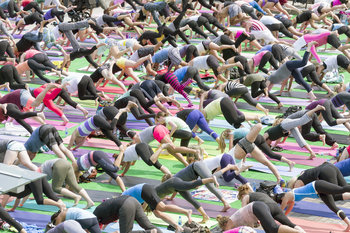The ideas below belong to Friedrich Nietzsche and do not represent the views of Simplicable or our writers.

Safety & Security
Man is a rope, tied between beast and overman — a rope over an abyss.Nietzche presents the last man as being a return to an animal-like state of existence whereby people are interested in the basics of survival such as safety and security above all else.
~ Friedrich Nietzsche, Thus Spoke Zarathustra
Harmony
Freedom means that the manly instincts which delight in war and victory dominate over other instincts, for example, over those of "pleasure."The last man is pacifist and abhors any type of military or social conflict. Nietzsche ridicules this as a "contemptible type of well-being dreamed of by shopkeepers, Christians, cows, females, Englishmen and other democrats."
~ Friedrich Nietzsche, Twilight of the Idols
Equality
The doctrine of equality! … But there is no more venomous poison in existence: for it appears to be preached by justice itself, when it is actually the end of justice ...A last man society has no distinction between the weak and strong, rulers and ruled. Individuality is strongly discouraged and being equal to the group is the highest possible achievement.
~ Friedrich Nietzsche, Twilight of the Idols
Risk
The higher we soar the smaller we appear to those who cannot fly.Nietzsche contrasts the last man with the ubermensch, or superhuman, who bravely seeks self-fulfillment by taking risk, making sacrifices and accepting pain. The last man is completely risk avoiding and fears the ubermensch. Last man societies seek to suppress ubermensch in the name of social harmony and risk avoidance.
― Friedrich Nietzsche, Thus Spoke Zarathustra
Spirituality
God is dead. God remains dead. And we have killed him. How shall we comfort ourselves, the murderers of all murderers?Nietzsche devoted much of his work to the question of what would replace the Christian belief that been the basis of Western civilization for close to 2000 years but was in decline in the late 19th century due to the scientific revolution. More specifically, Nietzsche examines the problem of nihilism and how civilization will deal with the idea that life has no meaning. Nietzsche identifies the last man as one possible outcome -- that society will simply drop any idea that life has meaning and pursue comfort such as entertainment.
~ Friedrich Nietzsche, The Gay Science
State Primacy
I, the state, am the people. It is a lie!Nietzsche implies the state is all powerful in a last man society and regulates every imaginable aspect of life.
~ Friedrich Nietzsche, Thus Spoke Zarathustra
Notes
Nietzsche is an extremely challenging philosopher who doesn't align to any political ideology or philosophy. He tends write shocking things, that were shocking at the time and are all the more shocking to modern values both liberal and conservative, religious and non-religious. Nietzsche has an amazing propensity to offend everyone. Nevertheless, he has interesting ideas and is amongst the most influential of all 19th century writers or philosophers.| Overview: Last Man | ||
Type | ||
Definition | A society that only values comfort, safety and harmony that suppresses individuality, risk taking and attempts to stand out above the group. | |
Related Concepts | ||































